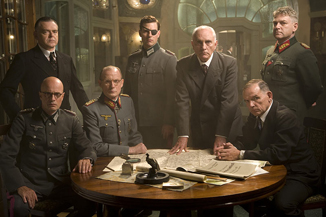Things We Learned from Movie X
World War II and Holocaust Movies
By Tom Houseman
June 9, 2009
Did anyone else notice that 2008 saw a remarkable number of films set in Germany during World War II? What brought on this rash of movies about such a gloomy subject? Is the War in Iraq weighing so heavily on our national consciousness that we are looking for anything to get our mind off of the subject? A war in which America (eventually) did the right thing and saved the day, perhaps? That's one explanation. Of course, the other is that movie studios have learned that the best way to get your movies nominated for Oscars is to have them be about the Holocaust. There's nothing better to get the Academy voters' tears flowing than to have them watch defenseless Jews marched into the gas chamber; just ask Roberto Benigni. That plan didn't work out too well this year, as The Reader scored a Best Picture nomination and Kate Winslet finally won her first Oscar, but Valkyrie, The Boy in the Striped Pajamas, Defiance, and Good all came up empty.
Considering how little attention I paid in my one high school European History classes, I didn't know too much about the events of World War II or the history of Germany in the 20th Century before 2008. Despite actually being Jewish and attending temple as often as most Jews (meaning exclusively the high holidays) I was painfully unaware of the facts surrounding the near-extermination of my people. Fortunately, after watching three 2008 World War II films, Valkyrie, The Boy in the Striped Pajamas and The Reader, I now consider myself an expert on these subjects. In case you missed these thoroughly depressing, generally unspectacular films, I'm here to fill you in on what historical lessons you could have learned.
1) Everyone in Germany spoke with a British Accent - Learned from: Valkyrie, The Boy in the Striped Pajamas
What's that, you say? You thought that people in Germany spoke some strange non-English dialect commonly referred to as German? What utter nonsense. Everyone knows that everyone in Germany, and in fact, everyone in all of Europe, spoke English. It made it much easier for us Americans to understand what they were saying that way, and the Germans have never been anything if not accommodating. But what you might not have known, at least until you saw The Boy in the Striped Pajamas and Valkyrie, was that Germans spoke with British accents. Men and women, adults and children, Nazis and Jews, all sounded like they wandered over from the set of the latest Harry Potter movie (David Thewlis and Kenneth Branagh even went from playing Lupin and Gilderoy Lockhart to playing Nazis). Thank goodness that they did, otherwise esteemed actors like Eddie Izzard, Bill Nighy, and The Departed's Vera Farmiga could never have starred in them. Of course, there is one qualifier to this otherwise firm rule...
2) Except for Tom Cruise and Hitler - Learned from: Valkyrie
Yes, obviously, most Germans spoke with British accents during the 1930s and ‘40s, but there are two exceptions. The greatest source of evil in the world, Adolf Hitler, was too evil even to speak with a British accent like most Germans. The hatred in his heart seeped into the rest of his body, twisting his vocal chords so that he could only speak with a German accent. And of course, if the ultimate evil doesn't have a British accent, then neither should the ultimate good, the ultimate good here represented by notable Scientologist/nut job/Nazi hunter Tom Cruise. Nobody who is tough enough to plan an assassination of Hitler could speak with a wimpy accent, especially when they are portrayed by the guy from Top Gun. USA all the way!
Continued:
1
2
|
|
|
|




